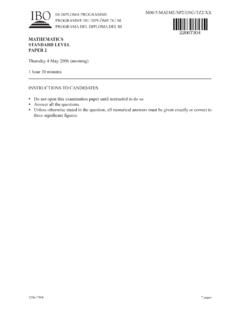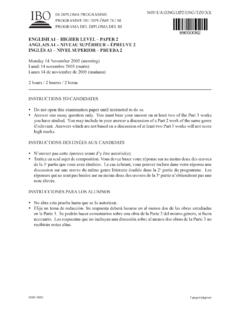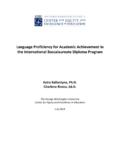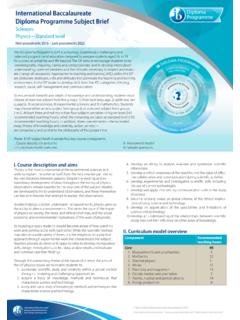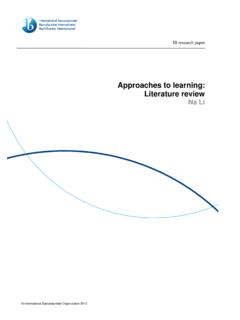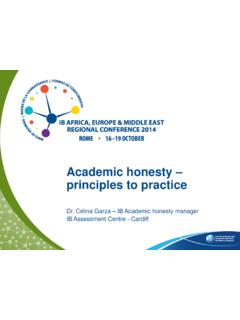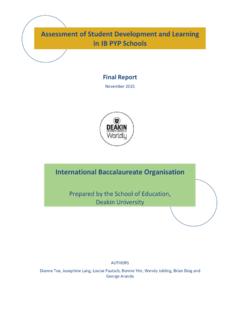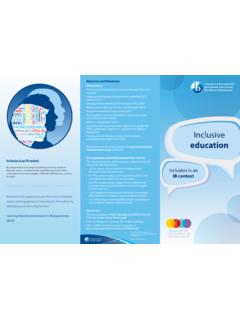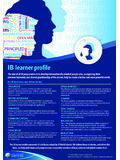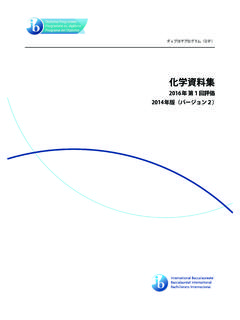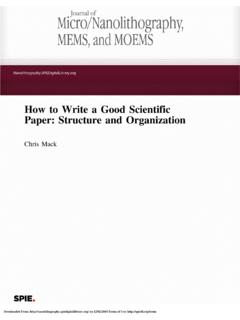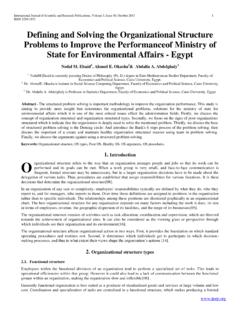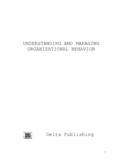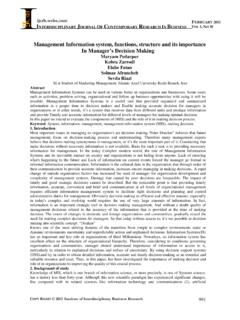Transcription of International Baccalaureate Diploma Programme Subject Brief
1 The IB Diploma Programme (DP) is a rigorous, academically challenging and balanced Programme of education designed to prepare students aged 16 to 19 for success at university and life beyond. The DP aims to encourage students to be knowledgeable, inquiring, caring and compassionate, and to develop intercultural understanding, open-mindedness and the attitudes necessary to respect and evalu-ate a range of viewpoints. Approaches to teaching and learning (ATL) are deliberate strategies, skills and attitudes that permeate the teaching and learning environment. In the DP students develop skills from five ATL categories: thinking, research, social, self-management and ensure both breadth and depth of knowledge and understanding, students must choose at least one Subject from five groups: 1) their best language, 2) additional language(s), 3) social sciences, 4) sciences, and 5) mathematics. Students may choose either an arts Subject from group 6, or a second Subject from groups 1 to 5.
2 At least three and not more than four subjects are taken at higher level (240 recommended teaching hours), while the remaining are taken at standard level (150 recommended teaching hours). In addition, three core elements the extended essay, theory of knowledge and creativity, activity, service are compulsory and central to the philosophy of the IB DP Subject briefs illustrate the following key course Course description and aimsII. Curriculum model overviewIII. Assessment modelIV. Sample questionsInternational Baccalaureate Diploma Programme Subject Brief Individuals and societies: GeographyFirst assessments 2019 International Baccalaureate Organization 2017 International Baccalaureate | Baccalaur at International | Bachillerato Internacional I. Course description and aimsGeography is a dynamic Subject firmly grounded in the real world, and focuses on the interactions between individuals, societies and physical processes in both time and space.
3 It seeks to identify trends and patterns in these interactions. It also investigates the way in which people adapt and respond to change, and evaluates actual and possible management strat-egies associated with such change. geography describes and helps to explain the similarities and differences between different places, on a variety of scales and from different perspectives. geography as a Subject is distinctive in its spatial dimension and occupies a middle ground between social or human sciences and natural sciences. The course integrates physical, environmental and human geography , and students acquire elements of both socio-economic and scientific meth-odologies. geography takes advantage of its position to examine relevant concepts and ideas from a wide variety of disciplines, helping students develop life skills and have an appreciation of, and a respect for, alternative approaches, viewpoints and at both SL and HL are presented with a common core and optional geographic themes.
4 HL students also study the HL core extension. Although the skills and activity of studying geography are common to all students, HL students are required to acquire a further body of knowledge, to demon-strate critical evaluation and to further synthesize the concepts in the HL aims of the geography course at SL and HL are to enable students to: develop an understanding of the dynamic interrelationshipsbetween people, places, spaces and the environment at differentscales develop a critical awareness and consider complexity thinking inthe context of the nexus of geographic issues, including: acquiring an in-depth understanding of how geographic issues, or wicked problems, have been shaped by powerful human and physical processes synthesizing diverse geographic knowledge in order to form viewpoints about how these issues could be resolved. understand and evaluate the need for planning and sustainable development through the management of resources at varying Curriculum model overviewSyllabus componentTeaching hoursSLHLG eographic themes seven options SL two options.
5 HL three options Freshwater Oceans and coastal margins Extreme environments Geophysical hazards Leisure, tourism and sport Food and health Urban environments6090SL and HL core Geographic perspectives global change Population distribution changing population Global climate vulnerability and resilience Global resource consumption and security7070IB Diploma PROGRAMMEINTERNATIONAL MINDEDNESSMATHEMATICSAND LITERATUREINDIVIDUALS THEORY OF KNOWLEDGE EXTENDED ESSAY CREATIVITY, ACTIVITY, SERVICEAPPROACHES TO TEACHINGAPPROACHES TO LEARNINGSCIENCESSTUDIES IN LANGUAGEACQUISITIONTHE ARTSLANGUAGEAND SOCIETIESA bout the IB: For nearly 50 years, the IB has built a reputation for high-quality, challenging programmes of education that develop internation-ally minded young people who are well prepared for the challenges of life in the 21st century and are able to contribute to creating a better, more peaceful further information on the IB Diploma Programme , and a complete list of DP Subject briefs, visit: Complete Subject guides can be accessed through the IB online curriculum centre (OCC) or purchased through the IB store: For more on how the DP prepares students for success at university, visit: or email: HL only Geographic perspectives global interac-tions Power, places and networks Human development and diversity Global risks and resilience60 Internal assessment SL and HL Fieldwork Fieldwork, leading to one written report based on a fieldwork question, information collection and analysis with evaluation 2020 Total teaching hours150240 III.
6 Assessment modelThere are four assessment objectives (AOs) for the SL and HL geography course. Having followed the course at SL or HL, students will be expected to do the following: knowledge and understanding of specified content the core theme global change two optional themes at SL and three optional themes at HL at HL, the HL extension global interactions in internal assessment, a specific geographic research Demonstrate application and analysis of knowledge and understanding apply and analyse geographic concepts and theories identify and interpret geographic patterns and processes in unfamiliar information, data and cartographic material demonstrate the extent to which theories and concepts are recog-nized and understood in particular synthesis and evaluation examine and evaluate geographic concepts, theories and perceptions use geographic concepts and examples to formulate and present an argument evaluate materials using methodology appropriate for geographic fieldwork at HL only, demonstrate synthesis and evaluation of the HL exten-sion global interactions.
7 , use and apply a variety of appropriate skills and techniques select, use and apply: prescribed geographic skills in appropriate contexts techniques and skills appropriate to a geographic research question. produce well-structured written material, using appropriate terminology. Assessment at a glanceType of assessment Format of assessment Time (hours)Weighting of final grade (%) 1 Each option has a structured question and one extended answer question from a choice of two. 2 Three structured ques-tions, based on each SL/HL core unit. Infographic or visual stimulus, with struc-tured questions. One extended answer question from a choice of 3 Choice of three ex-tended answer ques-tions, with two parts, based on each HL core extension written report based on a fieldwork question from any suitable syllabus topic, information collection and analysis with eval-uation. 20202520IV. Sample questions Examine the role of plate margin type in determining the severityof volcanic hazards.
8 Evaluate the success of attempts to predict tectonic hazard eventand their possible impacts. Evaluate the role of agribusiness and new technologies in increas-ing world food supply. Examine the relationship between food security and health. Using examples, analyse how technological developments canthreaten the security of states. To what extent does a global culture exist?
